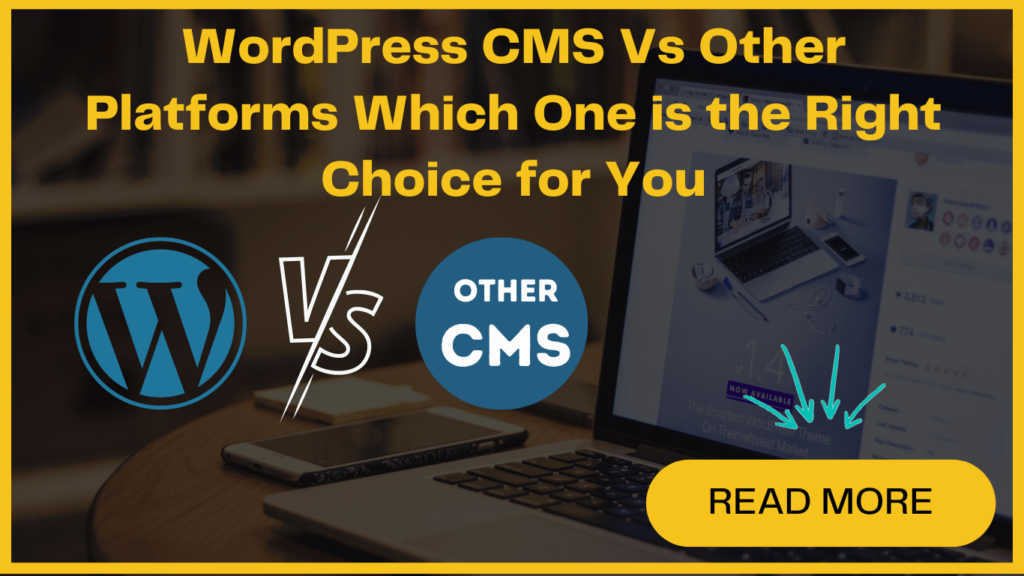
With a global market share of over 43%, WordPress stands as the leading website builder worldwide, offering compelling reasons for its widespread adoption.
Why WordPress CMS is a popular choice for a blog or website development?
Moreover, WordPress offers various social media tools that help in effortless integration with popular platforms to enhance social engagement. Beyond these basic features, WordPress provides advanced functionalities, catering to the needs of diverse industries and businesses.
However, with various WordPress alternatives in the market, making the right choice can be challenging. Let’s explore the unique features and benefits of WordPress CMS compared to other platforms to help you make an informed decision.
WordPress Vs Joomla
- Customization – WordPress takes the lead in customization. While both platforms can create different types of websites, WordPress offers a broader range of plugins compared to Joomla. Although Joomla boasts over 8,500 plugins and 1,100 themes in its official source, it cannot match the extensive offerings of the market-leading WordPress.
- Ease of Use – Both Joomla and WordPress can be easily set up on any hosting platform using an auto installer. Joomla organizes content using a combination of Articles and Categories, similar to WordPress. Though Joomla is not very complex, WordPress has a smoother interface and more intuitive options which makes it a better option for beginners and non-developers.
- SEO (Search Engine Optimization) – Joomla has a slight advantage in SEO capabilities. It allows for metadata input without the need for additional plugins and offers a few more useful options for search engine optimization. However, when considering add-ons, WordPress offers a comprehensive array of SEO tools to efficiently manage your website’s search engine visibility
- Security – Both CMS platforms have inherent security features. However, WordPress is more frequently targeted by hackers due to its popularity. Surprisingly, considering market share, Joomla sites are hacked more frequently on average. To enhance security, additional precautions and plugins can be implemented on both platforms.
- Support – Being the top CMS, WordPress enjoys a vast community of passionate supporters who contribute to its growth. Regular updates and a constant influx of new plugins and themes from developers worldwide enhance WordPress’s ecosystem. While you can learn Joomla from multiple resources like tutorials, video guides, and forums, it doesn’t compare to the extensive support and development community of WordPress.
WordPress CMS Vs Drupal
Let’s delve into the WordPress CMS vs. Drupal comparison:
- Customization – Drupal fares well in terms of add-ons, referred to as Modules. It provides a vast selection of resources to customize the look and feel of your website. With over 42,000 plugins and more than 2,500 themes available in its official sources, Drupal offers a wide range of options for visual customization. It stands on par with the offerings in the WordPress repository and outshines competitors like Joomla in this regard.
- Ease of Use – Drupal is primarily designed for developers and users with previous web development experience. While it is possible to create stunning websites with Drupal, it requires a steeper learning curve to unlock its full potential. In contrast, WordPress caters to a different audience that prefers to start creating pages immediately without extensive technical knowledge.
- SEO – Similar to Joomla, Drupal boasts built-in SEO features that WordPress can only achieve through plugins. Customizable metatags, caching mechanisms, and SEO-friendly URLs are among the built-in features in Drupal that are not inherent in the popular WordPress CMS.
- Security – Drupal is known for its robust website protection options that make it a preferred option for government organizations and large enterprises. Drupal developers actively and transparently address security improvements and patches, resulting in only 2% of hacked websites being built on it, as reported by Sucuri statistics. This highlights its strong security measures.
- Support – The Drupal community comprises approximately 1.4 million members, with about 10% actively contributing resources to this developer-friendly CMS. In spite of its smaller market share, this number reflects a substantial support base which ensures that support is available when needed.
When it comes to WordPress Vs other CMS, there are many WordPress alternatives. In this post, we are focussing on just two popular ones- Drupal and Joomla. We’ll be discussing the rest of the WordPress alternatives in our upcoming post, so stay tuned!




